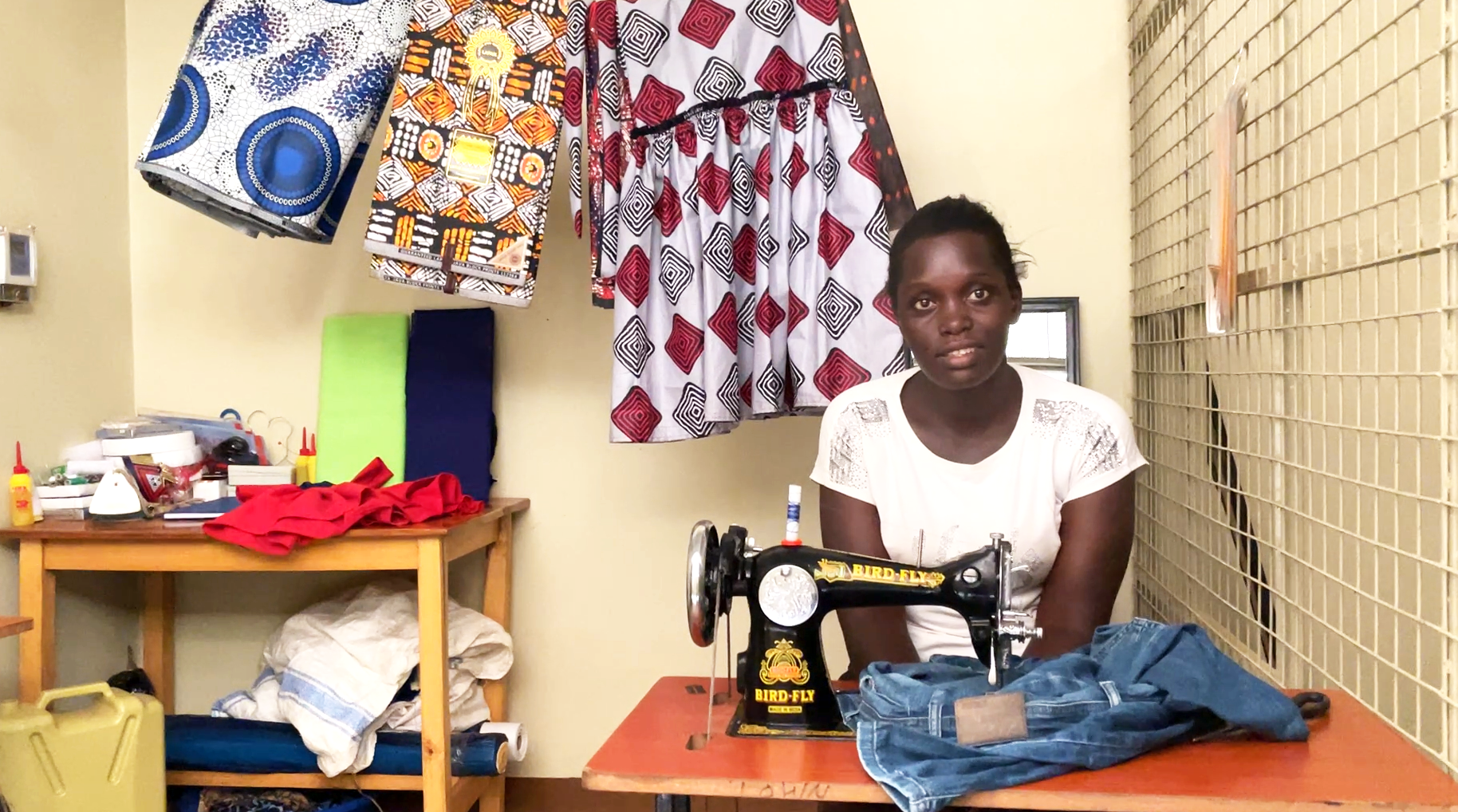The informal job market plays a crucial role for vulnerable Ugandans – where 2 out of 3 Ugandans eke out a living. Accessing it an important step to a better life. In the case of one young single mother, training to be a tailor helped her establish a business. And map a way out of poverty.
“My success would not have been possible without the training and tailoring skills I have gained and I am grateful for the opportunity. I encourage other young people to take advantage of such programs and pursue their dreams. With hard work, determination, and the right skills, anything is possible,” says Alepel Alice – a recent graduate from a skills training programme in Lobtuk in Northern Uganda.
Alepel is a 27-year-old single mother of one who enrolled for training as a tailor, specialising in fashion and design, through a DCA Uganda project funded by the EU – the Civil Society Organizations-Local Authorities (CSO-LA) project.
The project offered young people roles to play in the socio-economic development in Karamoja Subregion.
The training Alepel got has changed her life – a life that has not had a rosy start. Alepel’s life has offered more obstacles and challenges than most.
From school drop-out to a life on the streets
She was raised by a single mother in Jinja District. Her mother was a farmer with no education and no formal source of income – and she was struggling to food on the table, to pay for Alepel’s education or provide for her basic needs like pads and school supplies. Eventually Alepel was forced to drop out of school, and she found herself on the streets.
In search of a roof over her head she sought out paternal relatives in the Moroto District Karamoja sub-region – she had a strong urge to find support and a sense of belonging. And Alepel’s uncle took pity and invited her to stay with him.
Uncle with ulterior motives
However, the uncle did not only have Alepel’s interests at heart. He saw an upside for himself too. The uncle is a pastoralist and he decided to force her into marriage so he could collect the cows that a groom has to pay as bride price.
“I knew that getting married would not be the solution to my problems, and I refused my uncle’s proposal. With no support from my relatives, I was left to fend for myself and my daughter,” Alepel explains sadly.
Grabbing the opportunity
But then one day Alepel heard about a free youth skilling training program offered by Cooperation and Development (C&D) in Lobtuk. It’s was a program that included courses in tailoring, hairdressing, and carpentry.
“Since I had a passion for tailoring, I grabbed the opportunity and joined the program. Despite the challenges of being a single mother, I was determined to complete the six-month training program and become a skilled tailor,” Alepel says.
The program was offered through the EU Civil Society Organizations-Local Authorities (EU CSO-LA) project.
Overcoming obstacles – and building a business
Alepel had to overcome several obstacles while undergoing training, including trekking long distances to school while carrying her daughter on her back and tough weather conditions, particularly during the rainy season and on hot days, but she persevered and eventually she rose to the top of her class.
“After graduation, I started my tailoring business in the heart of the Moroto market, and I am now a successful businesswoman earning around UGX 140,000 weekly. I can afford to pay rent for my house and my shop, and my daughter’s school fees. I also get contracts from schools to make uniforms for their students,” Alepel says excitedly when she speaks of the changes in her life.
Like Alepel, other young people have also graduated with new skillsets in areas such as agriculture, animal husbandry, motor vehicle repair and maintenance, tailoring, brick-laying and concrete practice/masonry, electrical installation, and governance and advocacy. In fields like motor vehicle repair and maintenance, which are traditionally dominated by men, several girls were among the top trainees.
About the project
Through the project ‘Civil Society Organizations-Local Authorities’ (CSO-LA), youth in Karenga, Kaabong, Napak, Nakapiripirit, and Moroto districts were assisted to become economically included and empowered.
The project was implemented through a consortium comprising DCA, Cooperation & Development, and Caritas Kotido and ran for three years between 2020 and 2022. It was funded by the European Union with co-funding from DANIDA.
DCA economically empowers marginalized youth (women and men aged 18-35 years) by equipping them with marketable skills that enable them to become competitive in the job place. This includes soft and hard skills and linking them to employment opportunities in the private and public sectors as well as self-employment.
Through the project some 1,000 young people (app. 60% female) received vocational training in skills for self, formal, and non-formal employment. In addition, they were also equipped with advocacy and governance skills, to enable them to effectively participate in decision-making processes in their communities.
DCA focuses on building the economic, social, and environmental resilience of marginalized communities by increasing their production, income, and employment opportunities.



